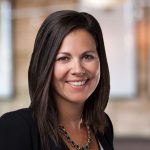Our Views
Celebrating financial empowerment on International Women’s Day
03/08/2019
Today is International Women’s Day and the campaign theme for 2019 is #BalanceforBetter, a slogan that calls for a more gender-balanced world, including greater gender balance in income and wealth.
Although the gender gap in personal income has narrowed in Canada over the past several decades – reduced by half from 1975 to 2015 according to a report by Statistics Canada – there is more progress to be made, as women’s incomes continue to lag their male counterparts.
One component of personal income that is especially close to our hearts as wealth managers, is investment income. We exist to assist women and men who want to optimize their investment income and overall wealth. Unlike government transfers, pension plans or employment wages, investment income is the one component of personal income that is uniquely within an individual’s own control. And it is gender neutral. It must also be said, however, that if employment income is lower, there is less money available for savings and investment – which circles back to the importance of also correcting, not only gender pay inequity but the more pressing social, political and economic obstacles facing women.
When women have the financial capacity and choose to invest, research (and certainly our experience) shows they do very well. Women have proven to be patient long-term investors and methodical decision makers who carefully assess risk prior to taking action. We are here to help facilitate that success. We also recognize everyone comes to the experience differently – with varying levels of knowledge, experience, engagement and confidence and we accommodate that. What is common to all is a desire for financial security and peace of mind that is universal and not at all gender specific.
For a perspective behind the research and statistics, we asked a few of the women of Newport to share their personal stories and influences on their path to acquiring financial knowledge and empowerment.
 Novlette Simpson, Chief Compliance Officer
Novlette Simpson, Chief Compliance Officer
I had a wonderful childhood growing up in Jamaica, raised by my grandparents who told me I could achieve anything I desired and be anyone I wanted to be. They provided everything I asked for, however, it was always prefaced by, “We don’t have any money.” As the first of 5 children, I always felt guilty for asking and, at 10 years-old, I vowed that I was going be financially independent so that I would never hear those words again.
Read more...
I began saving half of my daily lunch allowance and, by the time I left high school, I was unknowingly on my merry way to financial independence. I started my first job, in banking, the day after my 16th birthday and continued the same saving strategy by banking half of my salary. I have tried to maintain the same saving strategy throughout my career with each job promotion, salary increase and change in fashion choices.
In my early 20s, I took on financial responsibility for my parents and grandparents as their reward for believing in me and still do so today. I continue to manage these responsibilities and that of my own through a conservative, long-term investment strategy.
My advice to all women, you can be all you want to be and more if you believe in yourself. Life has had its ups and downs, but the promise I made as a determined 10-year-old for independence and empowerment, unknowingly became a life-long habit of wealth creation. Start early, invest small, invest smart.
 Amélie Beauregard, Associate Portfolio Manager
Amélie Beauregard, Associate Portfolio Manager
Materiality was never part of our upbringing, especially as both of my parents are the outdoor adventure types; you could describe them as frugal. The emphasis on money was put towards saving and spending cautiously on experiences such as camping in Hawaii and hiking around Canada. However, there were two pivotal events that occurred around the same time that made me become more engaged financially.
Read more...
The first was that my father sat me down and explained to me how he and my mother had put money aside through an RESP account for my education. He then proceeded to explain the importance of dividends. During that same year, my mother turned to me and said – “Amélie make sure that you are able to financially take care of yourself as you never know what will happen in the future.” Putting two and two together, I knew at 14 that it was time to take money a bit more seriously!
Living in downtown Toronto teaches you very quickly how easy it is to blow through a paycheque. I must admit when I first moved here it took me about a year to adjust my spending habits as temptation is everywhere. Budgeting and being realistic about how much I could afford to spend on non-essentials have become pillars in my relationship with money.
In our society, money is what allows you to live your life and plan for your future. It is an essential part of maintaining our overall wellbeing. Understanding the basics of money and investing gives you the confidence and independence to be in control of your life and your overall wellness. It is an empowering thing!
 Andrea Whitehead, Operations Manager
Andrea Whitehead, Operations Manager
You could say that finance runs in my blood, as my father was a senior executive at a large Canadian trust company, but I started out as an artist, studying performance arts and pursuing an acting career for a decade. I knew lots of “banking” people though; so, when I burned out after a long run of back-to-back stage gigs, I took a part time job as a teller and found there was something rather alluring about a steady paycheque and benefits!
Read more...
I didn’t know much about banking but I had two managers who believed in me. On their advice, I took the Canadian Securities Course and I committed to challenging myself, both personally and professionally. I promised myself I would never be afraid to admit what I didn’t know or to ask lots of questions, no matter how silly they might sound.
Professionally, that led me to a career in estate and trust services, where I could provide support and compassion to families during difficult circumstances. What I learned through managing estate assets and real estate gave me the confidence to eventually buy a little house and garden of my own in Toronto. It also gave me an opportunity to give back to the community, working with the United Way on finance and operational risk management oversight. Just before the Great Recession hit in 2008, I had decided to take a year sabbatical; when I was ready to get back to work, Newport gave me the opportunity to apply my administrative skills and knowledge to the wealth management industry.
Now, my path has come full circle. When my sister’s husband died suddenly at age 49, without a will, I could help her navigate the legal and financial requirements to oversee his estate. And, when my Dad passed away a few years ago, he was at peace knowing that I would take care of his estate for my mom and support her as she took on all the banking and investment tasks that he managed through their 55 years of marriage. I’ve even returned to the world of performing arts, as a director on the boards of two performance organizations in the city. I guess asking lots of questions was a successful policy in the long run.
 Shauna George, Portfolio Manager
Shauna George, Portfolio Manager
I would say I always had something of a financial bent. After all, my mother was an accountant. This, combined with a healthy dose of competitiveness, made me a master of the “One-Minute Multiplier” contest in elementary school! Until University I was on the path towards being an extroverted accountant but then I discovered the capital markets through finance courses, which opened up a whole new world for me.
Read more...
The biggest money lesson I learned early on, was how difficult it was to get rid of debt accumulated from student loans and credit cards. The burden of compounding interest at higher rates made it seem like an insurmountable task that took forever to pay off. It taught me to keep credit card use to a minimum and pay in full each month so that I wouldn’t dig myself into a hole that was more costly than the initial purchase!
As a CFA charterholder and Portfolio Manager, I have spent most of my career managing investments for clients of all sizes. As a result, I’ve always targeted to align myself with very smart and capable investment teams so that the same strategies used for client accounts can also be applied for managing my personal accounts. The other piece that’s important for people to know is that finance isn’t as daunting as some make it out to be. Clients should never feel like their questions are dumb and they should expect that their adviser will spend as much time as needed to make sure all of their questions have been answered to their satisfaction.
 Caitlin Chapman, Portfolio Manager
Caitlin Chapman, Portfolio Manager
The financial world, although evolving, is still very much dominated by men. Although intimidating at times, I feel that being a woman has its advantages and has been a driver for my career path. While writing my CFA exams there were numerous occasions when I found myself thinking “where are all the girls?” This really pushed me to continue to pursue finance and quickly turned into my passion to help other women take control of their wealth.
Read more...
Managing your money doesn’t mean you have to be good at math or live by a restrictive budget. It’s being educated on your own personal circumstance. You do not have to make all the decisions on your own. Rather, recognize your blind spots and find people you trust to help you.
For many people, including women, money is an emotionally-charged issue. It puts a roof over our heads, feeds our children. But it can also represent power and control in a relationship. Money is intertwined in almost every aspect of our lives and to throw your hands up and say “I’m not interested” is doing yourself a disservice.
Having an advisor available to answer questions isn’t enough. For many women, managing money has not always been their primary role. My clients tell me they sometimes don’t know the questions that need to be asked or are uncomfortable asking them. Advisors need to be proactive and present them with opportunities to enhance their wealth.
Subscribe to Our Views
*Please refer to our Privacy Policy to find out how we protect your information